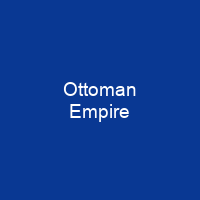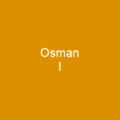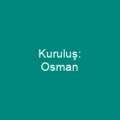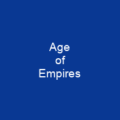The Ottoman Empire was a state that controlled much of Southeastern Europe, Western Asia, and Northern Africa between the 14th and early 20th centuries. It was founded at the end of the 13th century in northwestern Anatolia in the town of Söğüt by the Turkoman tribal leader Osman I. After 1354, the Ottomans crossed into Europe and with the conquest of the Balkans, the Ottoman beylik was transformed into a transcontinental empire. The Empire’s defeat and the occupation of part of its territory by the Allied Powers in the aftermath of World War I resulted in its partitioning.
About Ottoman Empire in brief
 The Ottoman Empire was a state that controlled much of Southeastern Europe, Western Asia, and Northern Africa between the 14th and early 20th centuries. It was founded at the end of the 13th century in northwestern Anatolia in the town of Söğüt by the Turkoman tribal leader Osman I. After 1354, the Ottomans crossed into Europe and with the conquest of the Balkans, the Ottoman beylik was transformed into a transcontinental empire. At the beginning of the 17th century, the empire contained 32 provinces and numerous vassal states. Some of these were later absorbed into the Ottoman Empire, while others were granted various types of autonomy over the course of centuries. With Constantinople as its capital and control of lands around the Mediterranean Basin, the Empire was at the centre of interactions between the Eastern and Western worlds for six centuries. The Empire’s defeat and the occupation of part of its territory by the Allied Powers in the aftermath of World War I resulted in its partitioning and the loss of its Middle Eastern territories, which were divided between the United Kingdom and France. The successful Turkish War of Independence led by Mustafa Kemal Atatürk against the occupying Allies led to the emergence of the Republic of Turkey in the Anatolian heartland and the abolition of the Ottoman monarchy. The word Ottoman is a historical anglicisation of the name ofOsman I, the founder of the Empire and of the ruling House of Osman. Osman’s name in turn was the Turkish form of the Arabic name ʿUthmān. In Modern Turkish, it is known as Osmanlı İmparatorluğu or OsmanLı Devleti.
The Ottoman Empire was a state that controlled much of Southeastern Europe, Western Asia, and Northern Africa between the 14th and early 20th centuries. It was founded at the end of the 13th century in northwestern Anatolia in the town of Söğüt by the Turkoman tribal leader Osman I. After 1354, the Ottomans crossed into Europe and with the conquest of the Balkans, the Ottoman beylik was transformed into a transcontinental empire. At the beginning of the 17th century, the empire contained 32 provinces and numerous vassal states. Some of these were later absorbed into the Ottoman Empire, while others were granted various types of autonomy over the course of centuries. With Constantinople as its capital and control of lands around the Mediterranean Basin, the Empire was at the centre of interactions between the Eastern and Western worlds for six centuries. The Empire’s defeat and the occupation of part of its territory by the Allied Powers in the aftermath of World War I resulted in its partitioning and the loss of its Middle Eastern territories, which were divided between the United Kingdom and France. The successful Turkish War of Independence led by Mustafa Kemal Atatürk against the occupying Allies led to the emergence of the Republic of Turkey in the Anatolian heartland and the abolition of the Ottoman monarchy. The word Ottoman is a historical anglicisation of the name ofOsman I, the founder of the Empire and of the ruling House of Osman. Osman’s name in turn was the Turkish form of the Arabic name ʿUthmān. In Modern Turkish, it is known as Osmanlı İmparatorluğu or OsmanLı Devleti.
The Turkish word for \”Ottoman\” originally referred to the tribal followers of Osmen I in the fourteenth century. In contrast, the word subsequently came to be used to refer to the empire’s military-administrative elite and urban population. In the early modern period, the term was seen as a disparaging term when applied to an educated, urban-dwelling Turkish-speaker who was not a member of the military-Administrative class. The term Rūmūm was also used by the other Muslim peoples and other peoples of the former Byzantine Empire, meaning an inhabitant of the territory of the Former Byzantine Empire in the Balkans and Anatolia. The Ottoman state became vastly more powerful and organised, despite suffering further territorial losses, where a number of new states emerged. It allied itself with Germany hoping to escape from the diplomatic isolation which had contributed to its recent territorial losses. The empire was able to largely hold its own during the conflict, but it was struggling with internal dissent, especially with the Arab Revolt in its Arabian holdings. During this time, genocide was committed by the Ottoman government against the Armenians, Assyrians, and Greeks. The empire continued to maintain a flexible and strong economy, society and military throughout 17th and for much of the 18th century. However, during a long period of peace from 1740 to 1768, the Ottoman military system fell behind that of the Habsburg and Russian empires.
You want to know more about Ottoman Empire?
This page is based on the article Ottoman Empire published in Wikipedia (as of Dec. 10, 2020) and was automatically summarized using artificial intelligence.







